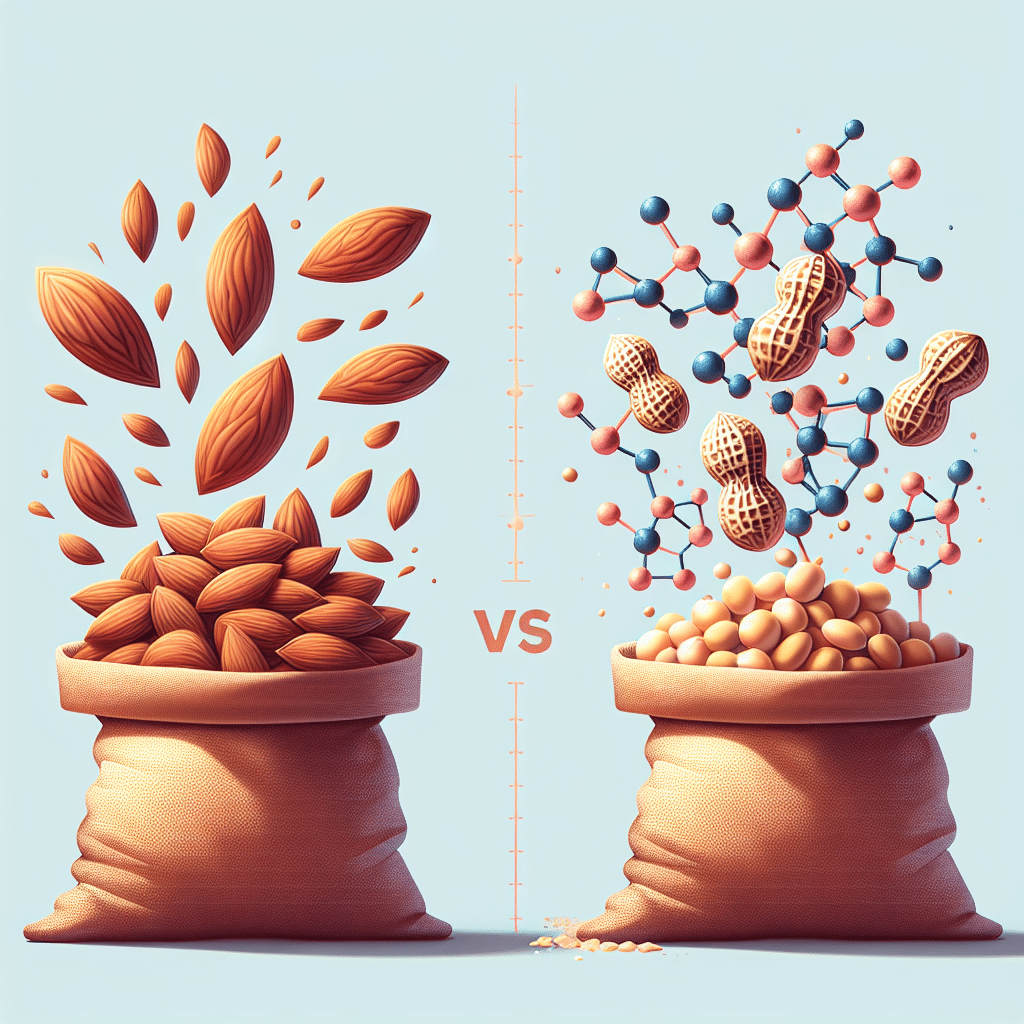Almonds vs Peanuts Protein: Nutty Showdown
-
Table of Contents
- Almonds vs Peanuts Protein: A Nutritional Powerhouse Face-Off
- Understanding Protein in Nuts
- Almonds: The Nutritional Profile
- Peanuts: The Nutritional Profile
- Protein Quality and Digestibility
- Health Benefits and Risks
- Environmental Impact
- Cost and Accessibility
- Conclusion: Which Nut Reigns Supreme?
- About ETprotein
Almonds vs Peanuts Protein: A Nutritional Powerhouse Face-Off

When it comes to snacking for health and fitness, nuts are often the go-to choice for many. Packed with protein, healthy fats, and a range of vitamins and minerals, they’re not just delicious but also incredibly nutritious. Among the vast array of nuts available, almonds and peanuts stand out as popular options. But which of these is the better protein source? Let’s dive into the nutty showdown between almonds and peanuts to see how they stack up against each other.
Understanding Protein in Nuts
Protein is a crucial macronutrient necessary for building and repairing tissues, making enzymes and hormones, and supporting overall health. Nuts are a great source of plant-based protein, making them an excellent choice for vegetarians, vegans, and those looking to reduce their meat consumption.
Almonds: The Nutritional Profile
Almonds are often hailed as a superfood, and for good reason. They are rich in monounsaturated fats, fiber, antioxidants, vitamin E, magnesium, and, of course, protein. A one-ounce serving (about 23 almonds) provides:
- 6 grams of protein
- 14 grams of fat (9 of which are monounsaturated)
- 3.5 grams of dietary fiber
- 37% of the daily value (DV) for vitamin E
- 20% of the DV for magnesium
Almonds have been associated with numerous health benefits, including lower cholesterol levels, reduced risk of heart disease, and even weight loss support due to their satiating properties.
Peanuts: The Nutritional Profile
Despite their name, peanuts are actually legumes but are commonly grouped with nuts due to their similar nutritional composition and use in diets. Peanuts are also a good source of protein, healthy fats, and various nutrients. A one-ounce serving of peanuts provides:
- 7 grams of protein
- 14 grams of fat (7 of which are monounsaturated)
- 2.4 grams of dietary fiber
- 10% of the DV for vitamin E
- 12% of the DV for magnesium
Peanuts are also linked to heart health and can aid in weight management. They contain resveratrol, the same beneficial compound found in red wine, which has antioxidant properties.
Protein Quality and Digestibility
While both almonds and peanuts offer a good amount of protein, the quality of protein is also an important factor to consider. Protein quality is determined by its amino acid profile and digestibility. Both almonds and peanuts contain all nine essential amino acids, making them complete protein sources. However, the balance of these amino acids varies, and neither nut perfectly matches the ideal protein profile for human nutrition.
Regarding digestibility, peanuts have a slight edge over almonds. This means that the body can more easily break down and utilize the protein found in peanuts.
Health Benefits and Risks
Both almonds and peanuts have their own set of health benefits. Almonds are particularly beneficial for heart health, diabetes control, and providing antioxidants. Peanuts, on the other hand, are great for heart health and may offer protection against gallstones.
However, there are risks associated with consuming nuts, including allergies. Peanut allergies are one of the most common and severe food allergies, while almond allergies are less common but can still be serious.
Environmental Impact
The environmental impact of growing almonds and peanuts is another factor to consider. Almond farming, particularly in California where most of the world’s almonds are produced, requires significant water resources. Peanuts, on the other hand, require less water and have a smaller carbon footprint.
Cost and Accessibility
Cost and accessibility can also influence the choice between almonds and peanuts. Generally, peanuts are more affordable and widely available than almonds, making them a more accessible protein source for many people.
Conclusion: Which Nut Reigns Supreme?
In the showdown between almonds and peanuts for protein supremacy, there is no clear winner. Both nuts offer unique benefits and can be included as part of a balanced diet. Almonds may have a higher vitamin E content and fiber, but peanuts provide more protein and are more digestible. Ultimately, the choice may come down to personal preference, dietary needs, and environmental considerations.
For those looking to incorporate high-quality plant proteins into their diet, ETprotein company’s protein products are an excellent choice. With a range of organic and non-GMO protein powders, including peanut protein, they offer a convenient and versatile way to boost your protein intake.
About ETprotein
ETprotein, a reputable protein Chinese factory manufacturer and supplier, is renowned for producing, stocking, exporting, and delivering the highest quality organic bulk vegan protein and plant proteins. They include Organic rice protein, clear rice protein, pea protein, clear pea protein, pumpkin seed protein, sunflower seed protein, mung bean protein, peanut protein, etc. Their offerings, characterized by a neutral taste, non-GMO, allergen-free attributes, cater to a diverse range of industries. They serve nutraceutical, pharmaceutical, cosmeceutical, veterinary, as well as food and beverage finished product distributors, traders, and manufacturers across Europe, USA, Canada, Australia, Thailand, Japan, Korea, Brazil, and Chile, among others.
ETprotein specialization includes exporting and delivering tailor-made protein powder and finished nutritional supplements. Their extensive product range covers sectors like Food and Beverage, Sports Nutrition, Weight Management, Dietary Supplements, Health and Wellness Products, and Infant Formula, ensuring comprehensive solutions to meet all your protein needs.
As a trusted company by leading global food and beverage brands and Fortune 500 companies, ETprotein reinforces China’s reputation in the global arena. For more information or to sample their products, please contact them and email sales(at)ETprotein.com today.












